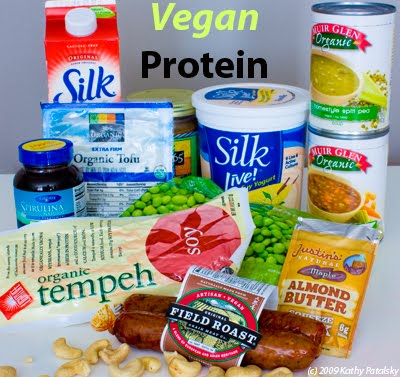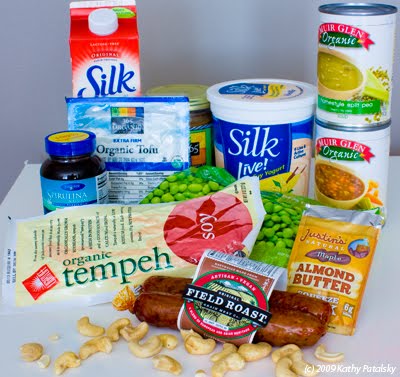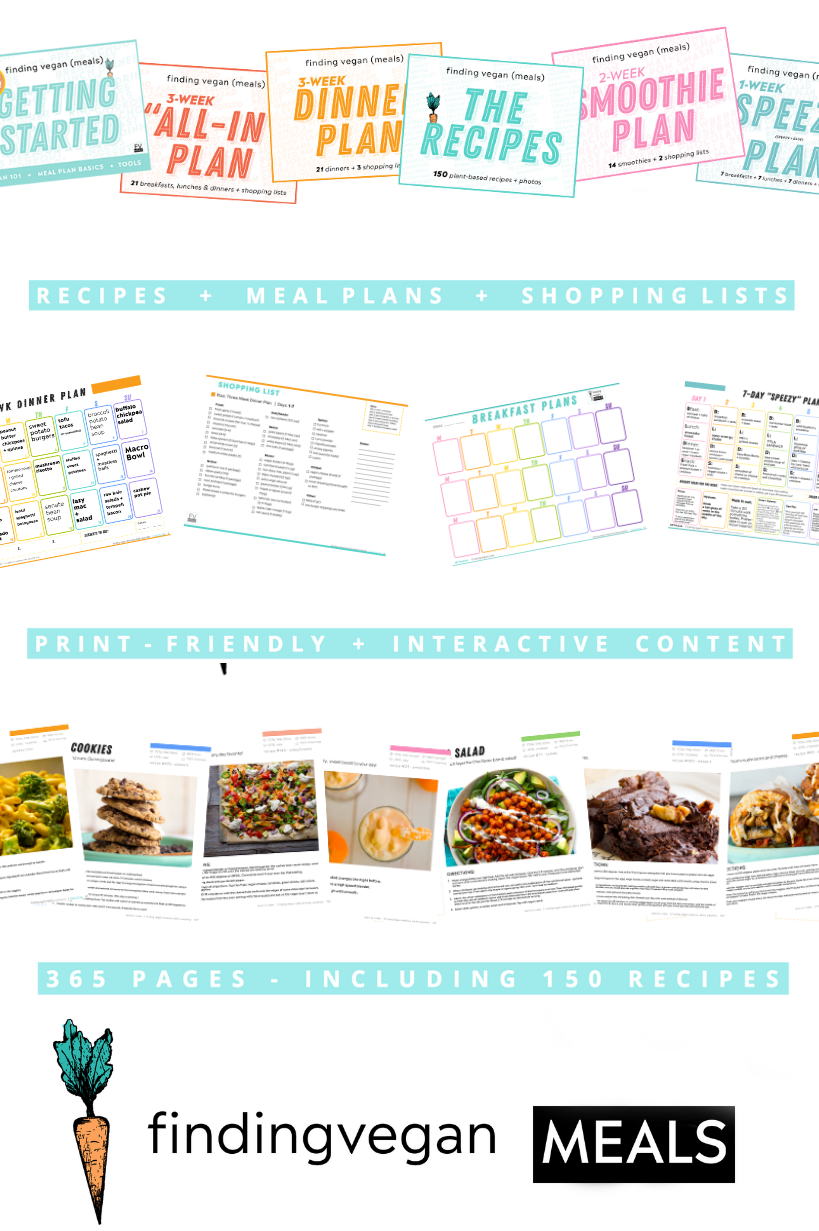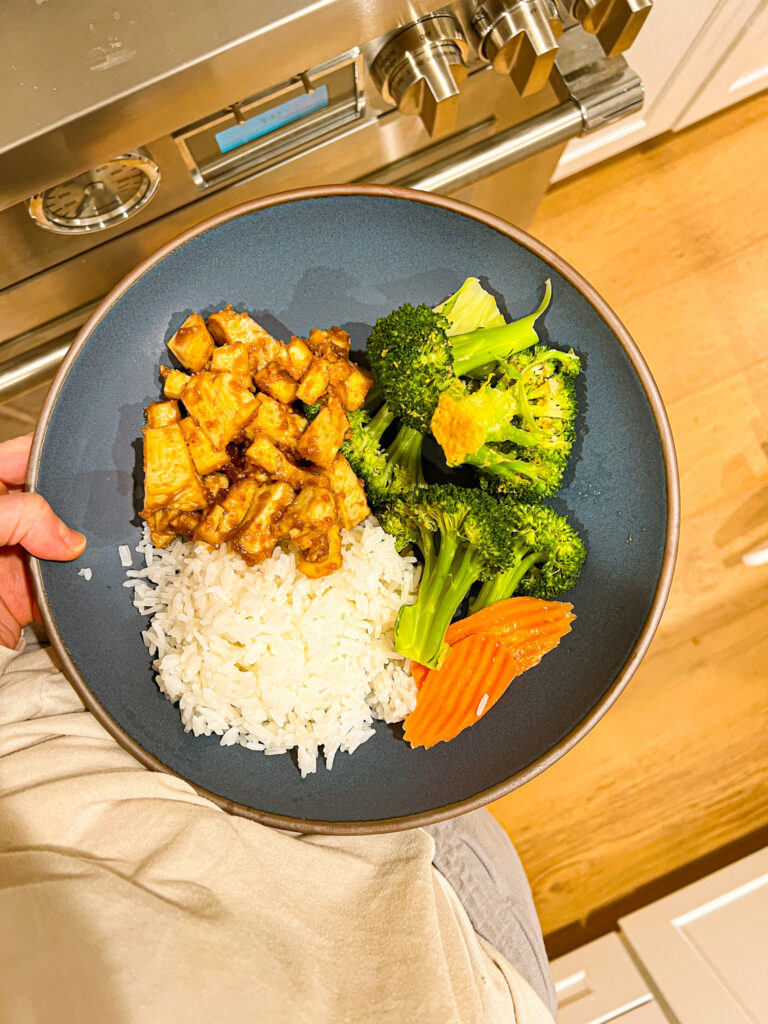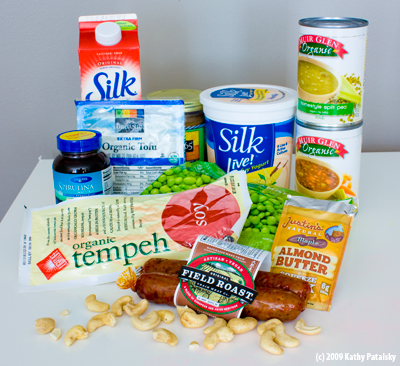
Tofu Burnout. The first question most people ask themselves when they consider ditching a traditional animal product diet is "Where am I going to get my protein from?" The most common answers: tofu, soy milk, maybe some beans. But then two weeks into your new veg*n diet, and you are on tofu burnout! What's your protein backup plan? I have to ask you, where's your vegan protein coming from?....
Vegan Protein Options. Tofu is great, but honestly, it takes some work in the kitchen to bring it from a lifeless white blob into something tasty and cravable. Good thing there are plenty other veg protein options-all widely available. Step outside the tofu block. Here is my top ten list (with nutritional facts) of vegan protein options...
Why do I Need Protein? Protein is an incredibly important nutrient, and one that you may be lacking if you are an unskilled or newbie veg*n. Here are just a few reasons why you need protein:
"*Protein is necessary for the building and repair of body tissues.
*It produces enzymes, hormones, and other substances the body uses.
*It regulates body processes, such as water balancing, transporting nutrients, and making muscles contract.
*Protein keeps the body healthy by resisting diseases that are common to malnourished people.
*Prevents one from becoming easily fatigued by producing stamina and energy." -Georgetown University
Get More Vegan Protein! Top Ten List.
*in no particular order.
1. Tofu
Tofu is the traditional white cube of soy that is stereotyped as the main source of protein for those on a vegetarian or vegan diet. I've found that while more veg*ns love tofu, it is not usually their main source of protein! I know that I eat more tempeh and edamame than I do straight up tofu. But tofu, is indeed a healthy food. Check out its nutrient profile:
Tofu Nutritional Data:
serving size: 79g. Calories: 80. Fat: 4g. Protein: 8g. Carbs: 2g. Fiber: 1g. Calcium: 6% RDA. Sodium: 0%.
2. Edamame
Edamamae are young soy beans, picked in their green pods. (While mature soy beans are usually used to make tofu and soy milk) young soy beans are served as is, and known as edamame. Edamame is often seen as an appetizer at Asian and Fusion style restaurants. Edamame is an unprocessed for of soy, which is always a good thing. The less processing, the better. Check out these nutrients:
Edamame Nutritional Data:
serving size: ½ cup (75g). Calories: 120. Fat: 4g. Protein: 13g. Carbs: 11g. Fiber: 4. Potassium: 420mg.
3. Soy Milk and Soy Yogurt
Soy milk and yogurt are both good sources of vegan protein, and incredibly useful in the kitchen. Soy yogurt is essentially identical to dairy yogurt, and can be used and substituted as needed. Soy milk is widely available in grocery store worldwide, and most coffee shops and cafes will have a 'soy' milk option for their beverages. Starbucks was one of the first national chains to jump on the "soy" milk bandwagon and lead the way to soy availability. Soy milk is often fortified with certain nutrients (similar to dairy milk), but most importantly the vitamin b12 nutrient. One glass of soy milk can contain anywhere from 25%-100% your RDA of B12. B12 is incredibly rare in plant-based food items, so fortified foods and supplements is often a good idea for vegans and even vegetarians. Soy Yogurt is an excellent source of probiotics for veg*ns. But always check to make sure that your Soy Yogurt is dairy-free! Some popular soy yogurts contain probiotic bacteria that is made from milk. Read those labels.
Silk Vanilla Soy Milk Nutritional Data:
serving size: 1 cup. Calories: 100. Fat: 4g. Protein: 7g. Carbs: 8g. Fiber: 1g. Potassium: 300mg. Calcium: 30% RDA. Vit B12: 50% RDA.
Silk Live Vanilla Soy Yogurt Nutritional Data:
serving size: 8oz (227g). Calories: 180. Fat: 1% RDA. Protein: 6g. Carbs: 31g. Fiber: 1g. Calcium: 40% RDA. Iron: 8% RDA.
4. Tempeh
I love tempeh. It is probably my favorite source of veg protein to get creative with in the kitchen. Tempeh is made from fermented soybeans, and sometimes contains mixed grains as well. The fermentation factor means that it is a source of veg probiotics. Just as you'll find good bacteria and enzymes in sauerkraut or oshinko, you'll find them in tempeh as well. Tempeh has a nutty slightly bitter flavor that compliments a wide variety of sophisticated foods and flavors. It is also much higher in fiber than most soy products like tofu and soy milk.
Tempeh Nutritional Data:
serving size: 4oz. (113g). Calories: 230. Fat: 8g. Protein: 22g. Carbs: 16g. Fiber: 12g. Calcium: 15% RDA. Iron: 20% RDA. Potassium: 380 mg.
5. Peas and lentils
Peas and lentils are great sources of vegetable protein! They contain fiber, nutrients and they are readily available. Whole peas can be added to salads, served as a side dish or blended up into a creamy pea soup. Lentils are also found in soup or you can buy them dried and use them in salads, curries and lentil soup. Super busy day? Pea or lentil soup is an easy protein-rich grab and go lunch. Simply grab a can of soup, heat and eat. However, watch the high sodium content in most canned soups. Low sodium soups are readily available in most brands now.
Pea Soup (not low-sodium variety) Nutritional Data:
serving size: 1 cup. Calories: 130. Fat: 0.5g. Protein: 8g. Carbs: 23g. Fiber: 4g. Sodium: 37%.
6. Whole Raw Nuts
Ra nuts are one of my favorite snacks. They provide long-term energy from carbs/fats/protein and taste great. I choose raw nuts because they are higher in live enzymes. Roasted nuts can destroy these enzymes. Salted nuts are tasty, but the salt can sometimes mask the true flavor or the nut. Try eating raw cashews instead of roasted for a few days, and I bet you will never go back to roasted. Nuts contain a significant amount of healthy fat, a variety of vitamins and minerals, fiber and even protein. My favorite nuts are: Brazil nuts, cashews, almonds, pecans, walnuts, macadamia nuts and peanuts.
Raw Cashews Nutritional Data:
serving size: 1oz. Calories: 155. Fat: 12g. Protein: 5g. Carbs: 9g. Fiber: 1g. Sodium: 0%. Iron: 10% RDA. Copper: 31% RDA.
7. Nut Butters
Versatile, delicious and super compact: nut butters are here to save the day! Almond butter toast, cashew buttered bagels and pb&j sandwiches are all veg friendly and contain a nice dose of protein. Just watch out, a little goes a long way for nut butters.
Almond Butter Nutritional Data:
serving size: 2 tablespoon (32g). Calories: 190. Fat: 16g. Protein: 7g. Carbs: 6g. Fiber: 4g. Calcium: 8% RDA.
8. Vital Wheat Gluten Based Products
"Wheat Meat" or "Seitan" is commonly how vital wheat gluten containing products are labeled. But the days of simple seitan are over. Perusing the aisles of whole foods I can find vegan 'lunch meat', vegan sausage, vegan bacon and even vegan hot dogs. Many of these items are made with vital wheat gluten (or TVP, another form of processed vegan protein). I recently discovered Field Roast Vegan sausage, and it's incredibly delicious. Sauteing a few circles of seasoned 'sausage' is much easier that sauteing unseasoned seitan for 20 minutes. Although, I love to do both...
Field Roast Vegan Sausage, Chipotle Mexican, Nutritional Data:
serving size: 93g, 1 sausage. Calories: 250. Fat: 12g. Saturated Fat: 1g. Protein: 23g. Carbs: 12g. Fiber: 4g. Iron: 10% RDA.
9. Beans and Hummus
Beans are a power food! They contain fiber, protein and a nice variety of nutrients. Plus there is a wide variety of types of beans and bean based recipes to choose from. It's pretty hard to get bean fatigue with so many options like: garbanzo, black, pinto, kidney, white, and navy beans just to name a few. Hummus made form tahini (ground sesame seeds) and garbanzo beans is a popular vegetarian option. However, not a super high source of protein.
Hummus Nutritional Data:
serving size: 2 tablespoon (28g). Calories: 40. Fat: 2g. Protein: 1g. Carbs: 4g.
10. Spirulina
Spirulina is a type of blue-green algae that contains 65-75% complete protein. Spirulina is also one of the rare veggie sources of vitamin b12. Spirulina is an easy add-in to smoothies and juices. I love acai-spirulina smoothies. Read more about Spirulina here.
Spirulina Powder Nutritional Data:
serving size: 1 teaspoon (3g). Calories: 10. Fat: 0g. Protein: 2g. Carbs: less than 1g. Iron: 10% RDA. Vitamin A: 100% RDA. Vitamin K: 20% RDA.
BONUS #11. Hemp
I always seem to stick a bonus #11 in my top ten lists, so here is a great bonus: hemp! Hemp has recently become a more mainstream way for vegans to get their protein. Hemp is a high quality protein because like soy beans, hemp seeds contain all 10 essential amino acids. Hemp seeds and products are also rich in omega-3 and omega-6 essential fatty acids (similar to flax seeds). Hemp milk and Hemp ice cream are delicious. However, you'll notice that most Hemp milk on the market today is much more expensive that soy milk. Say $4 a carton compared to $1.50 a carton. Hopefully the prices will go down as more consumers discover this veggie protein gem. Try my Hemp-Peach smoothie here.
Hemp Milk Nutritional Data:
serving size: 1 cup. Calories: 70. Fat: 5g. Protein: 4g. Carbs: 1g. Vitamin B12: 20% RDA.
Now go out there and get more protein to power up your busy week!!


